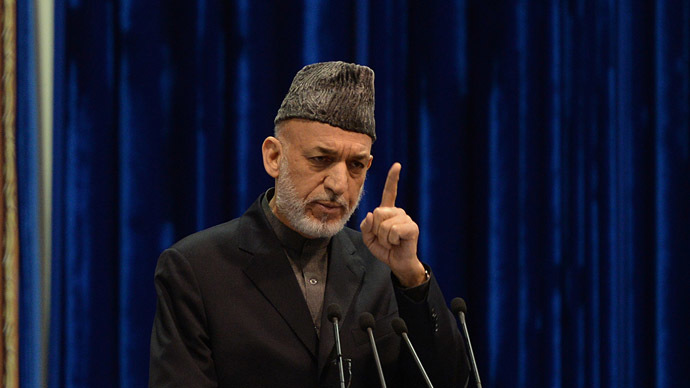If US-Afghan deal signed, Taliban will renew desire to 'resist occupation'
Without certain changes to win at elections, the Taliban is going to regenerate its desire to ‘resist occupation’ and continue fighting on the ground, foreign relations analyst Eugene Puryear told RT.
The US seeks to sign a security pact with Afghanistan by the end of this year. If the deal is signed, it will leave 15,000 troops behind. While the tribal leaders in Afghanistan endorsed the security pact, President Hamid Karzai maintained he wasn’t in a hurry to sign it.
Now Karzai is accusing the US of trying to pressure him into signing the deal and creating dependency by cutting off fuel supplies.
RT:Lately relations between the two have been strained. What are the chances of a deal being signed now at all?
Eugene Puryear: I think the chances are still relatively significant. A deal will be signed. The Karzai government is ultimately a puppet government of the US. We had a hard time surviving without American aid and aid from other NATO countries, but obviously the occupation is so hated. Karzai has to continually posture and show that he is an independent figure which makes its difficult.
It’s hard to tell because it’s a fine line for him to walk, but I think the others still think that the deal will be signed, but this dynamic of a puppet government also trying to appear independent to its own people, I think it’s a very difficult one for President Karzai and the others in Afghan government to work.
RT:What response to expect from Taliban If the deal is signed?
EP: I think if the deal is signed, the Taliban would most likely regenerate its desire to continue their struggle, to move forward. There have been limited peace talks between the US and the Taliban and of course President Karzai, one of his demands has been included there. Obviously, the Taliban is willing to pursue a two-way strategy. Ultimately, I think, they still believe they can win on the ground because of the weakness of the Karzai government. I expect them to regenerate their desire to resist occupation because the majority of the Afghan people are opposed to occupation. So it’s not hard to see why that would certainly harden their belief that their course could be victorious.

RT:Win by force or win politically? Next year the country will hold its first ever democratic presidential election. Politically, is there a chance the Taliban could win power?
EP: I think that certainly political things could favor them. We saw the last election even certified by the US government, it’s widely recognized, even by the anonymous leaks and anonymous sources of US government officials, that it was completely and totally illegitimate. Certainly if the election takes place in a similar template, that will not help any government that comes forward in terms of its legitimacy.
Do I think the Taliban could win politically? It’s difficult to say. Obviously, in a general sense Afghan people oppose the occupation but the Taliban hasn’t been able to emerge as the single force of the Afghan people. So I think it’s a divided country on a number of different issues but certainly, the continuation of the occupation doesn’t favor any government that allows it to go forward in terms of drones strikes, night raids, etc.
RT:What kind of outcome does the US want? And what sort of influence it could have on those elections if any?
EP: I think the outcome the US is hoping for is another government similar to the Karzai government will emerge, while it would be committed to whatever agreement is signed between the Karzai government and the United States. Ultimately for the US it’s really not about who the particular leader is - they will find someone. It’s about the fact that Afghanistan is at the crossroads of the world in so many ways: the Central Asian republics, which the West is attempting to influence in a way to be harsher towards Russia, China, Iran. And so having these 15,000 troops in Afghanistan is absolutely vital for the United States to extend its geopolitical power.
I think their entire goal with the election process and whatever they can do around it, will be to have a government emerged that is essentially alright with the US choosing Afghanistan as a base for power projection around the region.
The statements, views and opinions expressed in this column are solely those of the author and do not necessarily represent those of RT.
The statements, views and opinions expressed in this column are solely those of the author and do not necessarily represent those of RT.












